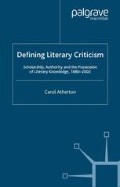Abstract
It is easy to see why the paradigms of disciplinary development outlined in Chapter 1 have played such an important role in accounts of the ‘rise of English’. Offering on the one hand an overarching vision of the ‘social mission’ of English studies, and on the other an abstraction extrapolated from other disciplines, they are attractive in their simplicity: their accounts of the subject’s development are neat, persuasive and easy to grasp. Nevertheless, this neatness can also be deceptive; and it is significant that many of the flaws contained in these paradigms stem from their tendency to remain at a distance from the day-to-day business of ‘doing English’. What these accounts do not engage with is precisely what is needed in order to bring the subject’s early years to life: the vexed and complex questions of what students were actually taught, who they were taught by and what they were expected to learn.
Access this chapter
Tax calculation will be finalised at checkout
Purchases are for personal use only
Preview
Unable to display preview. Download preview PDF.
Notes
Jo McMurtry, English Language, English Literature: The Creation of an Academic Discipline (London: Mansell, 1985), pp. 2, 5.
Alan Bacon, ‘English Literature Becomes a University Subject: King’s College, London, as Pioneer’, Victorian Studies, 29 (1986), pp. 591–612.
Hugh James Rose, The Tendency ofPrevalent Opinions about Knowledge Considered (Cambridge: Deighton; London: Rivington, 1826), p. 11. Quoted in Bacon, ‘English Literature’, p. 594.
See F. J. Hearnshaw, The CentenaryHistory ofKing’s College, London (London: Harrap, 1929), p. 124. Cited in Bacon, ‘English Literature’, p. 597.
Edward Copleston, review of Letter to Mr Brougham on the Subject of a London University, by Thomas Campbell, Quarterly Review, 33 (1825), p. 269. Quoted in Bacon, ‘English Literature’, p. 597.
Bacon, ‘English Literature’, p. 597.
F. D. Maurice, ‘Introductory Lecture by the Professor of English Literature and Modern History at King’s College, London, delivered Tuesday, October 13’, Educational Magazine, n.s. 2 (1840), p. 276. Quoted in Bacon, ‘English Literature’, p. 607.
Calendar of King’s College, London (hereafter KCC) (1903–4), pp. 84–5.
Owens College Calendar (hereafter OCC) (1881–2), pp. 30–1.
At King’s, set authors between 1880 and 1900 included Langland, Chaucer, Shakespeare, Spenser, Milton, Bacon, Hobbes, Harrington, Locke, Defoe, Newton, Hume, Hartley, Gibbon, Addison, Swift, Johnson, Wordsworth, Coleridge, Byron, De Quincey, Carlyle and Ruskin. The only novelists listed were all from the eighteenth century: Richardson, Fielding, Smollett, Sterne and Goldsmith. At Manchester, set authors between these dates included Chaucer, Shakespeare, Spenser, Milton, More, Clarendon, Burnet, Pope, Addison, Goldsmith, Smollett, Johnson, Gibbon, Burke and Richardson. It is significant that both lists include philosophers and historians, figures who would today be seen as peripheral to a more ‘literary’ notion of the canon.
Alfred Barry, ‘The Good and Evil of Examination’, Nineteenth Century, 3 (1878), pp. 656–8.
Terry Eagleton, The Function ofCriticism (London: Verso, [1984] 1996), p. 76.
John Churton Collins, ‘Can English Literature be Taught?’, Nineteenth Century, 22 (1887), pp. 644–5.
John Churton Collins, ‘The Universities in Contact with the People’, Nineteenth Century, 26 (1889), p. 583.
A. C. Bradley, Oxford Lectures on Poetry (London: Macmillan, 1941), pp. 4–5.
Christopher Kent, ‘The Academy’, in British Literary Magazines: The Victorian and Edwardian Age, 1837–1913, ed. Alvin Sullivan (Westport, Connecticut: Greenwood, 1984), p. 3.
Dr Ellis McTaggart, speaking at a meeting on 8 December 1910. Quoted in Cambridge University Reporter (13 December 1910), p. 406.
Ian MacKillop, F. R. Leavis: A Life in Criticism (London: Penguin, 1995), pp. 54, 56.
John Gross, The Rise and Fall of the Man of Letters: English Literary Life since 1800 (London: Penguin, [1969] 1991), p. 201.
Sir Arthur Quiller-Couch, Studies in Literature: Third Series (Cambridge: Cambridge University Press, [1929] 1948), pp. 149–50.
Sir Arthur Quiller-Couch, On the Art of Reading (Cambridge: Cambridge University Press, [1920] 1947), p. 24.
Copyright information
© 2005 Carol Atherton
About this chapter
Cite this chapter
Atherton, C. (2005). English in the Universities. In: Defining Literary Criticism. Palgrave Macmillan, London. https://doi.org/10.1057/9780230501072_3
Download citation
DOI: https://doi.org/10.1057/9780230501072_3
Publisher Name: Palgrave Macmillan, London
Print ISBN: 978-1-349-52393-1
Online ISBN: 978-0-230-50107-2
eBook Packages: Palgrave Literature & Performing Arts CollectionLiterature, Cultural and Media Studies (R0)

